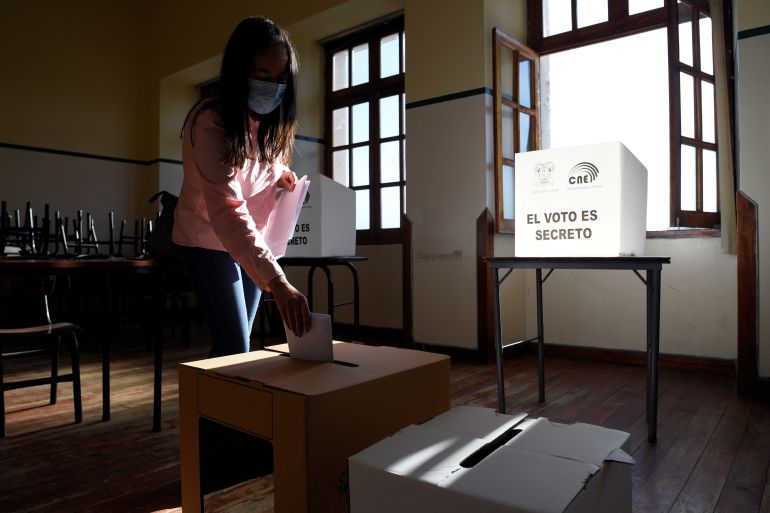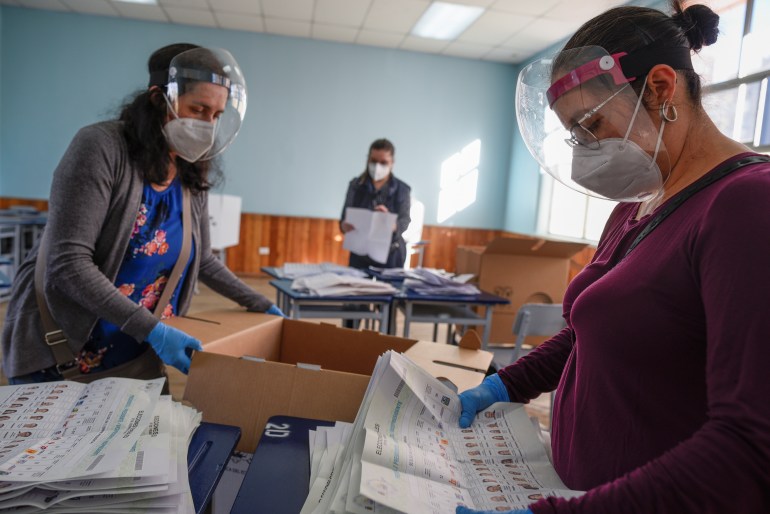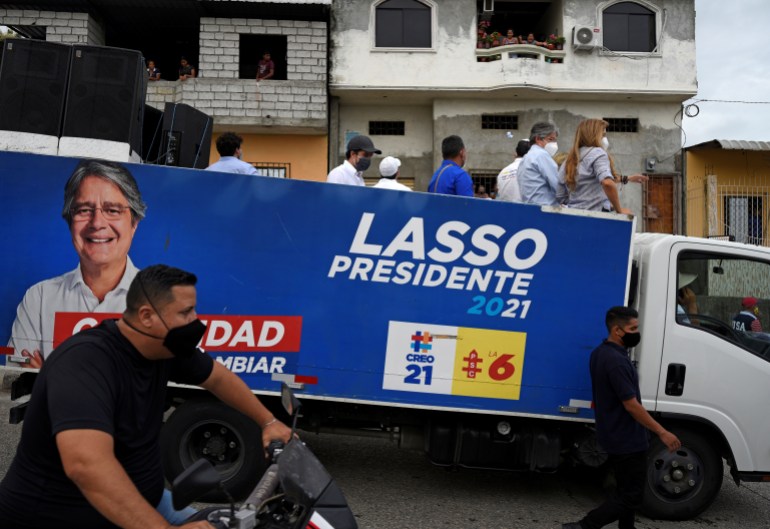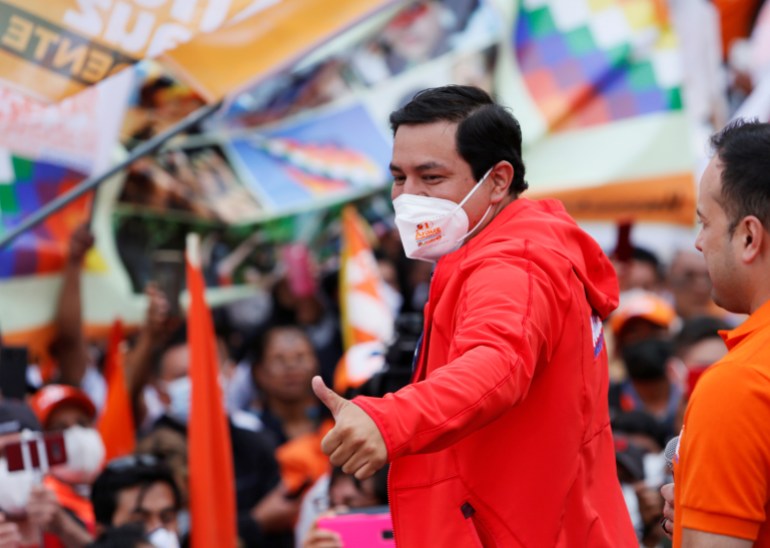How youth, women could decide Ecuador’s next president
Two presidential candidates, Andres Arauz and Guillermo Lasso, begin final stretch of campaigning on Tuesday ahead of April runoff.

Quito, Ecuador – Ecuador’s two final presidential hopefuls are beginning the last stretch of the official election campaign on Tuesday, only weeks before voters return to the polls for an April 11 runoff.
Economist Andres Arauz and former banker Guillermo Lasso will tour cities and towns across the country to spread their campaign messages.
Keep reading
list of 4 itemsArauz and Lasso advance to Ecuador’s presidential runoff
Ecuador’s Cuenca votes to ban future mining projects
How will Ecuador’s elections affect the future of the Amazon?
Arauz secured 32.72 percent support in last month’s closely fought first round of voting, compared to Lasso’s 19.74 percent – but with the candidates hitting the campaign trail yet again, experts say two specific groups of voters could hold the key to victory.
“Youth and women are two very important voting blocs that Arauz and Lasso have to start thinking about,” said Dayana Leon, an independent expert on elections and gender.
Key issues
Ecuadorians between the ages of 18 to 30 make up nearly 30 percent of the electorate, according to data from the National Electoral Council (CNE). While it is not mandatory, 16- and 17-year-olds can also cast a ballot in Ecuador, which would mean another 630,000 votes are up for grabs.
About 51 percent of the country’s 13 million eligible voters are women, of which 30 percent are between the ages of 18 and 30.
Ecuador’s longstanding economic woes, exacerbated by the COVID-19 pandemic, is a top issue for youth, while deepening inequality and violence is a priority for women.
Young Ecuadorians are particularly concerned by high unemployment, which sat at 32.7 percent in December 2020 among people aged 15 to 34. Students also often took to the streets during Ecuador’s initial COVID-19 lockdown in May 2020, after President Lenin Moreno’s government slashed $98m for 32 public universities and schools.
Women also are demanding greater economic support, as they were paid an average of nearly $50 less per month than men, who earned an average monthly income of $309.90 in December, according to the National Institute of Statistics and Censuses (INEC).

A high number of femicides have also spurred calls from women for greater government action. Feminist groups said at least 23 femicides have taken place since the start of 2021 in Ecuador, while 118 occurred last year.
Recently, Lasso announced he would open an ombudsman’s office specifically for women. He also plans to increase the minimum salary to $500 a month and create more jobs, while promising to ease the country’s rigorous university selection process.
For his part, Arauz has promised to return to the social policies under his mentor, former left-wing populist President Rafael Correa. He said he will offer $1,000 cheques to one million Ecuadorian families, as well as free internet for students and teachers, and create 400,000 new jobs.
“Lasso and Arauz have to win over a large number of voters who are looking for new options in the country … and an exit from the economic situation,” Leon told Al Jazeera.
Social media
Meanwhile, both Lasso and Arauz are trying to seize on the widespread use of social media in Ecuador to spread their campaign messages.
The candidates primarily use Facebook, Twitter, Instagram, and in the last months, they each launched respective accounts on TikTok, as well.
More than 14 million people in Ecuador have at least one account on either Facebook or Instagram, while 2.3 million people use TikTok, about half of whom are between the ages of 18 and 34, according to a January study by consulting firm Mentinno.
Lasso also recently hired the former campaign manager of presidential candidate Xavier Hervas, who finished fourth in the first round with nearly 16 percent of the vote, in his push to build a greater social media following.

Much of the support for Hervas, a Democratic Left party candidate who used TikTok to share his proposals, came from voters aged 18 to 21, according to Clima Social.
According to Andres Roman, a political researcher in Ecuador, the two candidates will need to focus on policy, instead of revamping their campaigns on social media, by incorporating various demands that were exposed during the first round of voting.
“The election on February 7 marked a new political moment,” Roman told Al Jazeera, explaining that it was marked by a debate between Arauz and Lasso about the influence of Correa, which did not resonate with young and female voters.
“But this election has indicated there are other demands which need to be listened to.”
Frustration with status quo
While Hervas and third-place presidential finisher Yaku Perez, an Indigenous and environmental activist, both adeptly used social media during the first round, most experts attribute the support they garnered to a general frustration with the status quo.
Ecuador’s political landscape remains deeply fragmented after previous governments pursued either neoliberal or leftist populist policies.
Heading into the first round, Arauz and Lasso focused largely on pro- and anti-Correa talking points – similarly to what Ecuadorians heard throughout the 2017 election campaign. After the first round, it became evident there is fatigue about Correa, said Roman.

Arauz, so far, has appeared most willing to hear alternative voices and focus on other issues. For example, on March 7, the eve of International Women’s Day, Arauz met feminist activists to discuss a variety of issues.
But as Correa’s protege, he has faced the added challenge of trying to appeal to left-wing activists with whom the former president frequently clashed during his 10 years in power. The same group of activists has also invited Lasso to meet, but he has not yet accepted their invitation.
Samanta Andrade, a 27-year-old feminist activist who participated in the dialogue, said she felt some of Arauz’s responses lacked clarity.
“If Arauz wishes to grow closer with the feminist movement, he will need to call out the political violence under Correa,” Andrade told Al Jazeera.
The next clear test will come on March 21, as Arauz and Lasso are set to face off in a presidential debate, giving Ecuadorian youth and women a chance to see whether the two will seek to address issues that matter most to them.